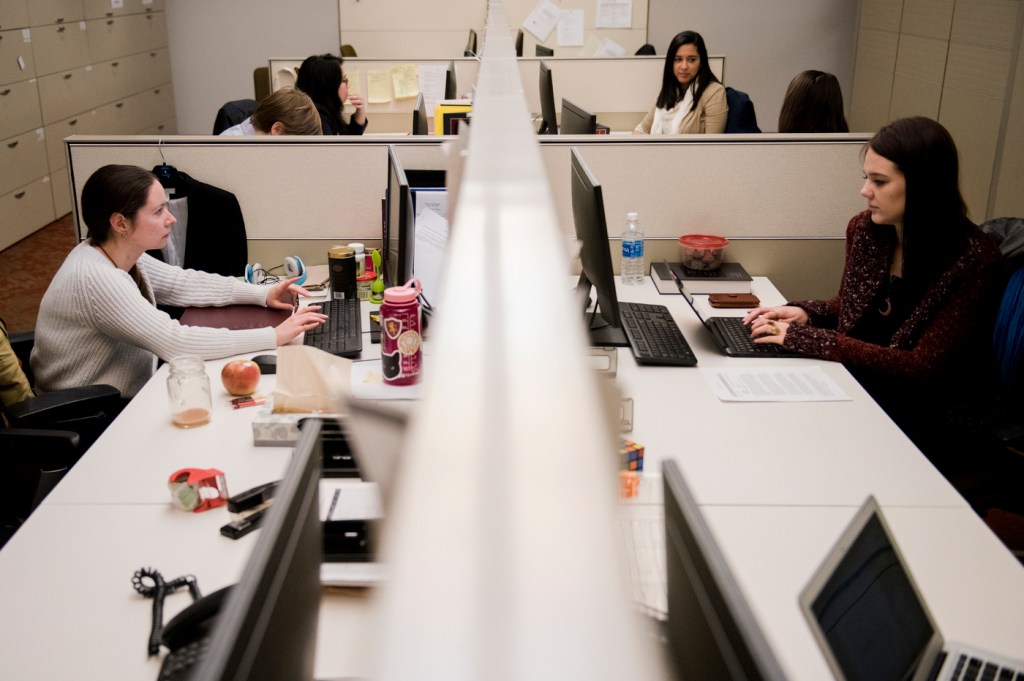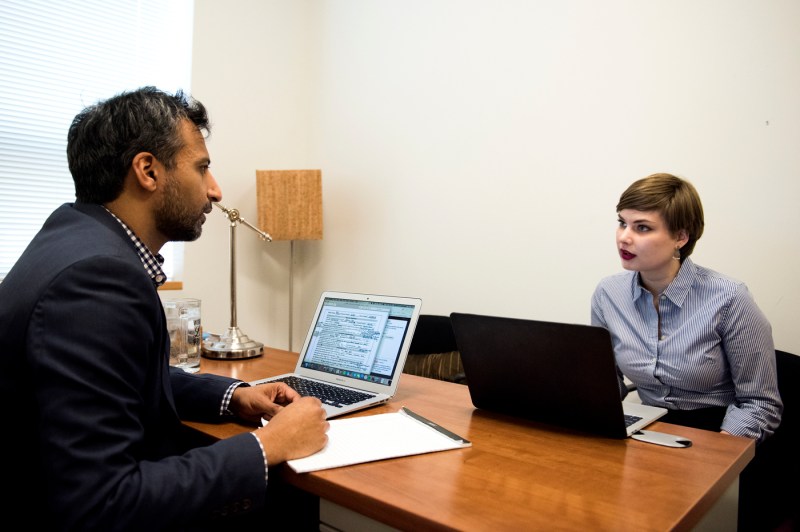Law clinic fights for immigrant justice

On a Tuesday morning in early February, the School of Law’s Immigrant Justice Clinic in Dockser Hall is bustling with activity, as students conduct research for their clients seeking asylum in the U.S., draft legal briefs, and meet with their faculty supervisors in small groups to discuss the intricacies of immigration law.
The students represent the clinic’s first cohort, which began its work in November at the start of the winter quarter. The Immigrant Justice Clinic is the newest of the law school’s clinics that, collectively, provide justice and resources to people in transformative ways.
“What’s really special about the clinic is that the students have an enormous amount of responsibility combined with comprehensive supervision and time for reflection,” said professor Rachel Rosenbloom. She and associate teaching professor Hemanth Gundavaram serve as the clinic’s co-directors.
Students in the clinic are able to represent clients directly because they’re under the supervision of licensed attorneys in Rosenbloom and Gundavaram. The clinic involves meeting for class two times a week, checking in weekly with their faculty supervisors, and dedicating at least 20 hours a week to their cases. In class, students discuss their cases and bring up legal questions or other issues they can help each other with.
What’s really special about the clinic is that the students have an enormous amount of responsibility combined with comprehensive supervision and time for reflection.
Rachel Rosenbloom, Professor of law
The 11 students in the clinic work closely with noncitizens on a range of immigration matters. For one, they represent clients seeking asylum and manage all aspects of their cases, which includes meeting with them weekly and preparing the legal documents required by U.S. Citizenship and Immigration Services. A critical component is the asylum applicants’ testimony, a declaration in their own words about what has happened in their lives and why they fear returning to their countries of origin. The students work with their clients, many of whom are not native English speakers, to prepare testimonies that explain why they should be allowed to stay in the U.S.
Additionally, the clinic has partnered with the Political Asylum/Immigration Representation Project, which provides free legal services to asylum-seekers and promotes the rights of detained immigrants. Students in the clinic conduct intakes at local immigration detention centers and write legal and factual analyses for the PAIR Project, which the organization uses to determine how they can best provide legal assistance to these detained immigrants. The PAIR Project has also connected the Northeastern law clinic to clients who students are now representing.
This quarter, students in the clinic also engaged in an advocacy project in coordination with the Committee for Public Counsel Services, the state agency that oversees court-appointed attorneys.
Seth Purcell, a staff attorney at the PAIR Project, said that clinics such as Northeastern’s provide an invaluable service to asylum-seekers, who often face a complex and ever-evolving immigration landscape. Not only do many asylum-seekers face language barriers, but their need for assistance is also particularly acute given they are fleeing from horrific circumstances in their home countries and often arrive without any support network, he said.
“The clinic’s genesis is coming at a very timely point in history, and it’s something that’s addressing a very large societal need,” said Purcell, himself a 2015 graduate of Northeastern’s law school. “Legal services are extremely difficult to access. Resources are very limited. We’re only able to handle a percentage who come to us, so having a place like Northeastern’s Immigrant Justice Clinic as another potential home for these clients and cases is very encouraging and allows us to serve even more people.”
He added: “Having legal representation can truly save somebody’s life.”

Second-year law student Lili Giacoma, who plans to practice immigration law after graduation, joined the clinic because of its blend of independence and strong faculty supervision. Giacoma and another student are collaborating to represent a woman who has been persecuted in her home country. “Meeting with our client every week and building a relationship and establishing that trust—that’s been very meaningful to me,” Giacoma said.
In March, Giacoma will begin a co-op at DOVE Inc., in Quincy, Massachusetts, which provides a range of services to victims of domestic violence. She said the job is the perfect fit for her career outlook, at the intersection of immigration law and helping domestic violence survivors. “Having experience in the law clinic definitely helped me get my next co-op,” she said.
Third-year law student Alyssa Kane entered the law clinic with co-op experience in both immigration and employment law. Working in the clinic, she said, has further underscored that the clients need not only assistance in their asylum cases, but also resources for even more pressing matters such as finding employment and housing. “They often have a very difficult time accessing benefits they might very well be eligible for,” Kane explained. “I’m interested in doing employment and housing work, and seeing if we can expand public benefits for people in our clients’ position.”
Gundavaram emphasized the many ways in which the clinic’s students acquire valuable real-world experience, from bolstering their interviewing skills, to gaining in-depth legal analysis and writing practice, to navigating the complexities of immigration law and explaining it all to those without law backgrounds. They also work closely with many other parties, such as psychologists, social workers, and government agencies involved in immigration matters.
“All of this will make them stronger lawyers,” he explained.





